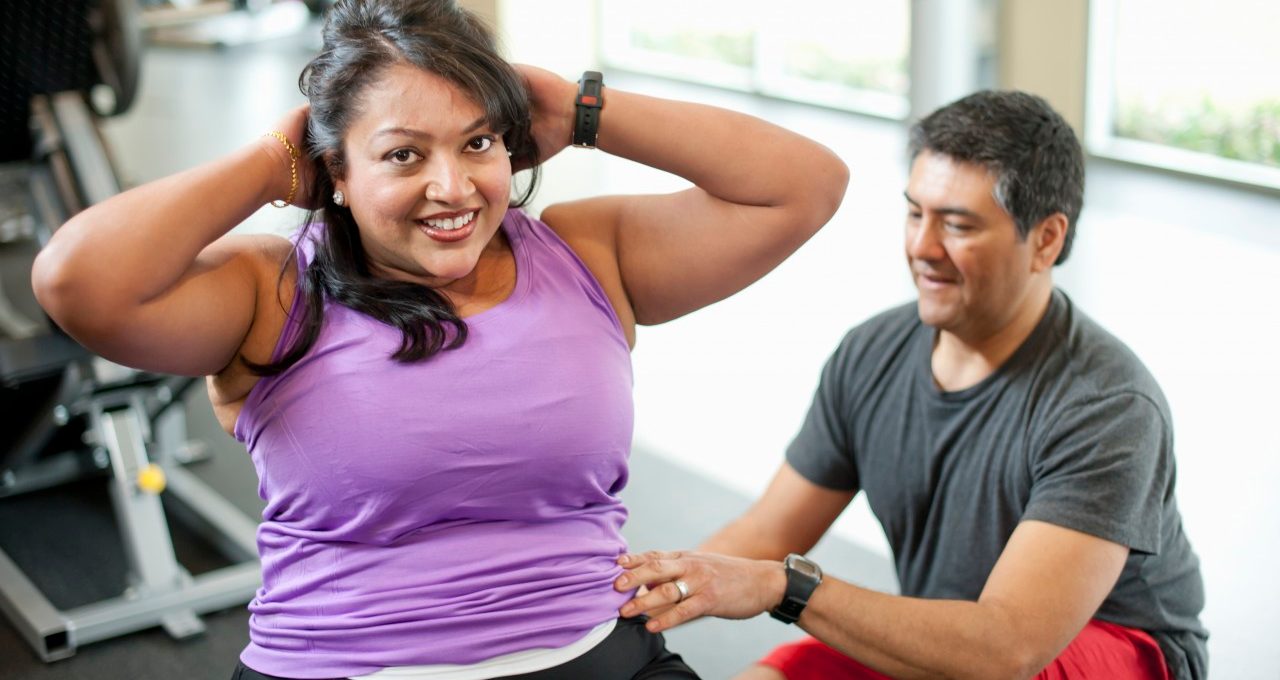Get Fit First!

Being in shape is more important than extra pounds.
Nearly 70 percent of American adults are overweight or obese, and we’ve lots of bad news about the dangers of extra fat. As your body fat increases, so does your risk of gallstones, and sleep apnea. Given all the things that can go wrong, it might seem obvious that being heavier would be directly linked to dying younger. But, it turns out, another factor is more important: how fit you are.
Fitness is an umbrella term that includes many measures. In fit people, the heart and lungs deliver oxygen to the body efficiently. We build aerobic capacity by moving. Unfortunately, many people now must sit most of the day to work and travel, so they have to go out of their way to move. Even standing more will help. Fit people also use their muscles regularly to build strength and endurance.
Lack of fitness is more dangerous than extra weight. In a study of more than 5,300 middle-aged men who didn’t smoke or have heart disease, men with aerobic capacity below 80 percent of the expected level were significantly more likely to die over 14 years — whether they were of normal weight, overweight, or obese. Similarly, in a 14-year study of 855 heart disease patients, the people who weren’t fit were more likely to die even if they were normal weight. Fatter people who were fitter did better.
Much evidence suggests that fitness, including aerobic capacity and muscle strength, mostly overcomes the bad effects of fat. In a study of 1,506 hypertensive men, those in the upper third of both muscular strength and aerobic fitness were least likely to die. Muscle strength alone helped, again whether you were of normal weight or packing extra.
The trouble is that heavier people are often out of shape. Exercise feels harder when you have more weight to move. Some people avoid workouts because they feel ridiculous in exercise clothes or are afraid they’ll collapse if they walk half a block.
If you’ve been stalled by embarrassment, try roping a plus-size friend to join you or get started at home with videos. Talk to your doctor before you start exercising, and seek out exercise that feels emotionally rewarding — make your own dance tape and dance around your living room. Start slow with something you know you can do, and keep up, even if only once a week. Don't be in a hurry to ramp up to match someone else or assume an "all or nothing" attitude, thinking you have to do a strenuous hour and a half every day for the rest of your life to get any benefit.
Moderate exercise counts. A study with a big pool, 661, 137 adults, found that the sweet spot — when you are likely to gain the most longevity for your time — came from moderate exercise, typically walking, for just over an hour a day. People who didn’t exercise at all were 39 percent more likely to die prematurely than this group. But you are 31 percent less likely to die early than the non-exercisers if you get about 20 minutes of walking a day. Another study found a sweet spot exercising 150 minutes a week, including at least 45 minutes of more strenuous activity.
If you start and get sore or bored, it's time to change your approach. A good trainer can make your workout more interesting and teach you proper technique so you are less likely to hurt yourself. Take a class, or try a different type of workout if you hit a plateau. Many women do aerobic exercise but don’t want to lift weights. You can build muscles without any special equipment, using full large water bottles as dumbbells, or resistance bands. One-armed pushups or one-legged squats up the challenge.
Don’t exercise hoping for quick weight loss. It could take three months or more before you notice changes in your body, and you may find that you’re eating more unless you consciously cut back. Focus on fitness rather than your appearance.
A big butt or belly isn’t an early-death sentence. In a large meta-analysis of 97 studies of nearly 2.9 million people, researchers found that people classified as mildly obese — with a body mass index (BMI) of 30 to 35 — were no more likely to die than people of normal weight. Surprisingly, people who were overweight — with BMIs of 25 to 30 — were slightly more likely to survive than the normal cohort. Why that’s so isn’t completely clear, but the benefits of fitness are. Most people find that when they get more exercise they sleep better, are more energetic during the day, feel less stressed, and tackle work with greater enthusiasm. Give yourself that boost.
Updated:
April 08, 2020
Reviewed By:
Janet O’Dell, RN